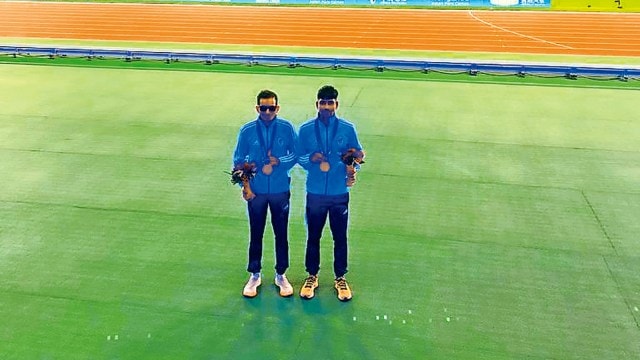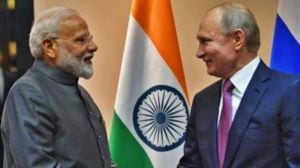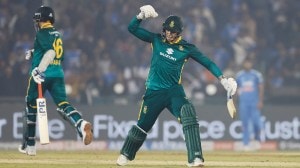Meet Ankur Dhama, athlete who clinched 2 gold medals at Asian Para Games
Singh, who has trained physically challenged sportspersons for more than a decade now, added, “For visually impaired persons, athletics is challenging as it takes more persistence and hard work than it would for a normal sportsperson to build his/her stamina and speed.”
 (Left) Ankur Dhama and his guideperson Dharmender Gurjar
(Left) Ankur Dhama and his guideperson Dharmender Gurjar During the 2016 Rio Paralympic Games, Ankur Dhama injured himself and thought it was the end of his career as a sportsperson. Eight years later, he bagged two gold medals, winning the Men’s 1,500 m T11 and the Men’s 5,000 m T11 events, during the fourth edition of the Asian Para Games currently underway in Hangzhou.
Congratulating Dhama on his win, Prime Minister Narendra Modi Wednesday took to X (formerly Twitter) and wrote: “An incredible triumph for @AnkurAthlete, as he clinches his second Gold Medal in Asian Para Games, this time in the Men’s 1500 m-T11 Final. May he keep running towards greater heights in the coming times.”
Being visually challenged has not stopped the 29-year-old from soaring ahead.
Born in Uttar Pradesh’s Baghpat district, he is the youngest of three siblings. He grew up in Sonipat, where his father was a farmer. Speaking to The Indian Express, Dhama said, “I was around five to six years old when I lost my vision completely. Doctors told my family that I wouldn’t be able to see again. I then moved to Delhi where I studied at a school for the visually impaired on Lodhi Road.”
It was at this school that Dhama first realised he had a knack for athletics.
In 2017, while he was pursuing his Masters in History at St Stephen’s College, tragedy struck with the death of his father from a cardiac arrest. He said, “I had to take care of my family. Financially, there was a crunch… But I always had help… from my coaches. My mother and siblings boosted my morale; I also received financial help from GoSports Foundation.”
Satpal Singh, who has been training Dhama for 15 years now, discovered him at the school. “This is a huge achievement for Ankur and me. He had faced several challenges in life but never gave up. I am so proud of him that after his injury during the Rio event, he recovered, practiced relentlessly, and won two golds for our country,” he said.
Singh, who has trained physically challenged sportspersons for more than a decade now, added, “For visually impaired persons, athletics is challenging as it takes more persistence and hard work than it would for a normal sportsperson to build his/her stamina and speed.”
Dhama also credited his achievements to his guideperson: “When it comes to long-distance running, one requires a lot of stamina… Maintaining energy levels and synchronising with the guide are among the major challenges in the sport… For visually impaired sportsmen like me, guides are our beacon. They should also get the recognition they deserve as they spend so much time training with us.”
The athlete also reflected on the times when he almost gave up. “My morale sometimes was low as I realised that I can’t pursue what I love without being dependent on someone… But if this inspires even a small group of individuals who are differently abled to push forward and pursue a sport in their life, I will consider myself a winner,” Dhama said.
His guide, Dharmender Gurjar (20) from Rajasthan’s Karoli district, has been with Dhama for more than a year now. “I moved to Delhi so I could train at Nehru Stadium and become an athlete. That’s where I met Ankur and his coach. Since then, I have been working as his guideperson. We practice together every day and run in races,” said Gurjar.
A Class XII student pursuing Arts back in Rajasthan, Gurjar said he also has his own practice sessions to improve his speed and stamina. He too dreams of representing India internationally one day.







